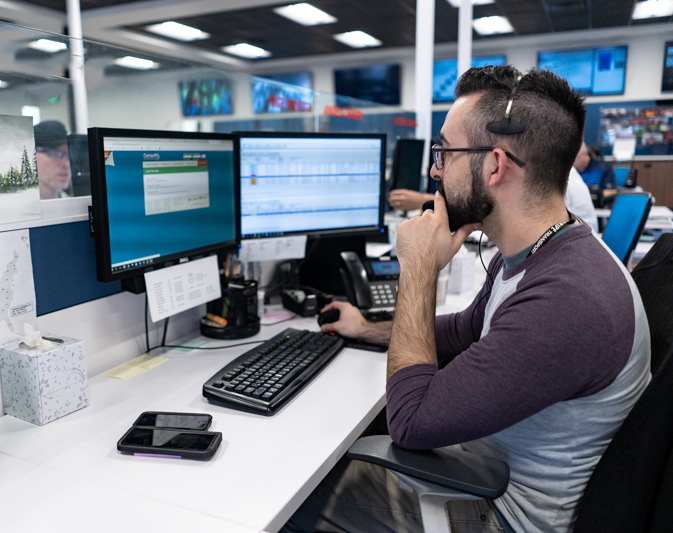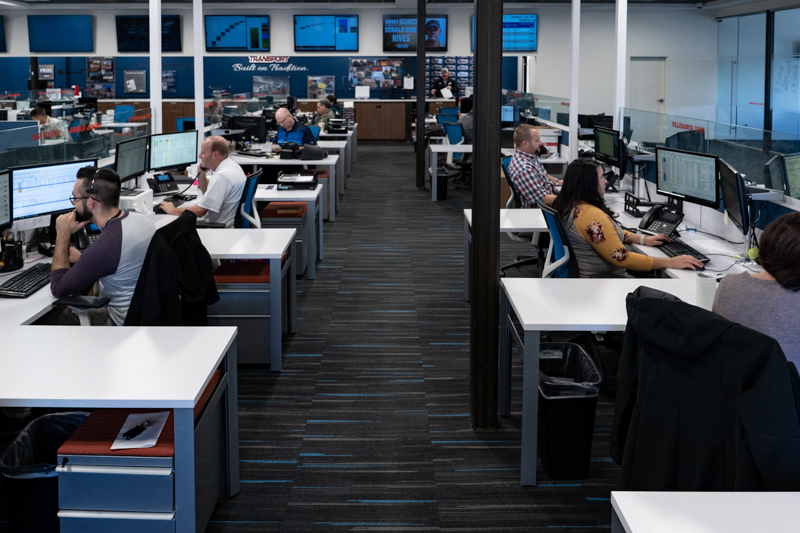by Pride Transport | Jul 17, 2023
Communication is one of the most important parts of working in the trucking industry, which is why companies have dispatchers who communicate regularly with the truck drivers on the road. Dispatchers are masters at scheduling, and their job is to tell you where you’re going and what you’re transporting. They also help make sure you’re on schedule and delivering items on time. Without them, important clients could be lost or you could be missing out on major paydays.
If you think you might want to be a dispatcher instead of a driver, this is one career that will keep you close to home.
What Is a Dispatcher?
Dispatchers create and optimize the routes that truck drivers use. Dispatchers have many responsibilities, including:
- Making sure you’re scheduled to deliver goods
- Working with customers to get their goods to their destinations on time
- Communicating slowdowns and problems you need to know about to prevent hazards and delays
They make sure that the processes involved with the company’s services, such as picking up and delivering packages, goes smoothly.
Truck dispatchers have the primary task of getting items scheduled for pickup or delivery, but they can also do other things like receiving calls or maintaining records to do with your working hours or schedule. Dispatchers sometimes find clients and negotiate rates, and they also take steps to address issues (like truck maintenance or repairs).

How Do Truck Drivers and Dispatchers Stay in Touch?
Dispatchers communicate with drivers in several ways. Some of the most common means of communication include the use of:
- GPS tracking, which shows where drivers are to more effectively communicate their route and schedule. This hardware is installed in each vehicle and sends satellite signals to the trucking company’s server.
- Mobile apps, which may show where drivers are or include a way to communicate via text.
- Two-way radios, or CB radios, which allow dispatchers and truck drivers to communicate directly with each other. These radios provide instant access to drivers or dispatchers so everyone can receive timely updates and information.
Constant communication and regular tracking can help dispatchers and truck drivers alike. With these tools, dispatchers can keep in touch with the fleet and make sure each driver has updates on traffic delays, the weather conditions in the areas they’re traveling to, and other relevant information that helps keep them safe. Drivers also communicate with dispatchers to let them know about problems they’re dealing with on the road, like loose cargo or a breakdown, so the dispatchers can update their routes or arrange for towing and transport.
What Kind of Training Does a Dispatcher Need?
Since dispatchers are responsible for coordinating the delivery and pickup of cargo, it’s essential that they have the training needed to communicate effectively, use scheduling tools, and maintain great organization.
Usually, the minimum education requirements for truck drivers include a high school diploma or GED. Then, potential dispatchers will want to take a truck dispatching training course to learn more about the industry and the skills needed to be successful.
Some of the most important skills for dispatchers to develop include:
- Interpersonal skills, including empathy, good communication skills with truck drivers and clients, and the ability to work well with others
- Strong attention to detail, meaning you’re able to stay well organized and to handle several jobs or tasks at one time
- Good problem-solving skills to track potential problems on routes and find alternative routes or options for drivers who run into delays or other issues on the roads
- Adept computer and technical skills to use scheduling software, mapping applications, and many other tools to help truck driving teams get where they need to go
Being able to prioritize the most important tasks and knowing when to rearrange priority, are also important. Good analytical and problem-solving skills make this part of the job easier. And as a dispatcher, you’ll also need to be able to work well with clients, helping set appointments or maintain calendars successfully.
Another educational point to mention, and one preferred by some companies, is the potential to obtain an associate’s degree in transportation, logistics, or a related field. That degree is often an excellent starting point for a bachelor’s degree in those fields too, which can open up additional job opportunities.
Dispatcher Training at Pride
At Pride Transport, we believe it’s very important for our dispatchers and drivers to be able to work together. Our focus is on helping our team have open, effective communication to help prevent safety issues and to make sure our customers are satisfied with our services.
With better communication, we see a number of benefits, such as:
- Increased efficiency. Instead of wondering how to get around a traffic jam, for example, dispatchers help reroute drivers before a slowdown occurs. Routes are scheduled based on where drivers are on the road, and dispatchers keep schedules balanced to make them easier to complete.
- Improved safety on the road. Dispatchers and drivers can communicate about safety issues, like blown tires and breakdowns, so they can request help.
- Better customer service. Dispatchers can communicate with clients and customers about where their items are, so customers stay happy with the services provided by the company and continue to work with Pride.
Good communication means that drivers will be more likely to get their loads delivered or picked up on time. They’re also more likely to go to the right destinations without many slowdowns or delays. And, with an eye on the road, truck drivers who openly communicate with dispatchers effectively communicate the challenges they have so their dispatchers can help them find a way to get around or overcome them.
More specifically, we train all of our dispatchers and team members to be:
- Safety-minded
- Knowledgeable
- Reliable
- Hard-working
- Approachable
Maintaining these values has helped our company thrive for over 42 years.
Begin Your Truck Dispatching Career With Pride Transport
If being out on the road isn’t for you, another option is to look into a role as a dispatcher. In this role, you’ll work closely with drivers and customers, helping negotiate, schedule, and manage the transportation of goods.
At Pride Transport, we have a selection of jobs that are behind the scenes jobs in the trucking industry! Whether you would prefer to work in the office or out on the road, we have an opportunity for you! Check out our latest job openings here.
